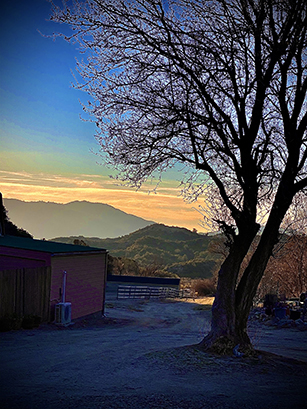Being Ready in the Case of an Emergency
We love living in Anza! Being a part of this close-knit and rural area is a wonderful and satisfying experience.
Living in our beautiful rural area does require a certain level of self-reliance and knowledge regarding our various home systems. Being Ready in the Case of an Emergency is paramount. Here are some things to consider for disaster preparedness and emergency situations concerning your home systems, and how to be prepared for situations that might arise. Earthquakes, Fires, Power Outages, Severe Weather.
Propane System
- Propane tank shut-off valve. Knowing where to turn it off can prevent gas leaks or fires.
- Inspect Regularly. Check for leaks, corrosion, or damage to the tank and lines regularly. Look for signs of wear and tear especially before winter or after storms.
- Installing a propane gas detector in your home is a good idea to alert you of any leaks. Ensure you have a plan to safely exit the building and call for help if the alarm sounds.
- Insure that any indoor propane appliances have proper ventilation to avoid dangerous gas buildups.
Electric System:
- Main Electrical Panel. Be familiar with your home’s electrical panel and how to safely shut off power if necessary.
- Generator Set-Up. If you have a generator, make sure it is properly installed and maintained, and ready when you need it. Know how to connect it to your homes system without back feeding which can be dangerous for utility workers.
- Surge Protectors: Use surge protectors to safeguard sensitive electronics and appliances from power surges that can occur during storms or when power is restored.
- Emergency Lighting: Keep a supply of battery powered, or solar powered lights, and to power up phones.

Other Factors to Consider:
- Emergency Communication. Ensure that you have a reliable communication form, such as battery or crank type radio, solar and/or battery phone chargers.
- First Aid and Medical Supplies. Keep a well stocked first aid kit and consider taking a first aid and CPR class, as emergency services may take longer to reach you.
- Food and Supply Storage. Stock up on non-perishable food and medications that can last you for several days, more if you have the space and ability.
- Heating and Cooling. Have backup plans for heating and cooling, especially in extreme weather conditions.
- Vehicle and Fuel Storage. Keep vehicles in good condition and maintain an emergency fuel supply for generators and vehicles. Tire pumps that can be plugged into your car lighter.
Road Access
- *Keep your driveway clear and accessible for emergency vehicles. Know alternative routes in case your primary road becomes impassable.
Neighborhood Network
- Establish a community emergency plan with your neighbors to share resources and assist one another during emergencies.
Hard Copies of Important Information
- Phones can malfunction, and contact lists may not be accessible. Keep Family members, neighbors, Utility Companies, telephone numbers Insurance policy information .etc.

Disaster Preparedness

Well System
- Water Shut-Off Valve. Know the locations of your well’s shut-off valve. This is usually located on the well pump, or on the water pressure tank. In case of a leak or an emergency, you should be able to quickly turn off the water supply to prevent loss of pressure or contamination.
- Well Head and Pump. Ensure that the wellhead and pump are properly sealed and protected from contaminants. In the event of a flood or severe weather, secure any external components and keep the area clear of debris.
- Water Storage. Keep an emergency supply of water on hand for drinking, cooking, and sanitation purposes. This is crucial during power outages when the well pump may not be operational.
- Emergency Power. It is recommended to consider installing a backup power source like a generator to operate your well pump during outages.
Septic System:
- Septic Tank Location. Know where your septic tank is to avoid accidentally damaging it with vehicles or construction work.
- Conservation Practices. Use water efficiently, and avoid flushing non-biodegradable items to prevent system overload.
- Flood Preparation. If your area is prone to flooding, know how to protect your septic system from inundation.

Evacuation Plan
- Have an evacuation plan that includes routes and meeting points, as well as plans for your pets and livestock.
By understanding and being prepared for the unique challenges of rural living, we can enhance our family and our home’s safety. We can efficiently reduce the impact of emergency situations. Regularly review and update your emergency preparedness plans and educate all family members on what to do in case of an emergency. Let’s be prepared! It’s a good thing!
WATCH DUTY
Watch DUTY, which is a great place to keep up with all active fires.
WATCH DUTY is an excellent resource for everyone in California (Both inside and outside of the real estate industry).
WATCH DUTY is an Invaluable Free App. This App Has Information About Wildfires, the Total Acres Involved, Containment Percentages, and detailed Evacuation Zones. It Also Features Pertinent Videos and Photos.
Please join us as we continue to pray for all the people under evacuation, People in the Path of the Fires, All the Animals in the Path of the Fires, and, of course, our brave firefighters who keep us safe.
Please Feel Free to Share This Information With Anyone Who Lives in Southern California



